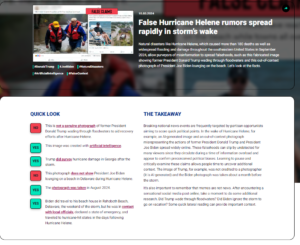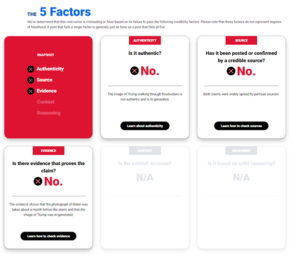If you study political science, psychology, sociology, public relations, marketing or law you may already suspect this. Misinformation has been with us since humans started communicating. The mass adoption of email, texting, the internet and social media added a hair trigger to the misinformation highway.
We carry our hair-trigger pointer fingers around with us 24/7 along with our smart phones and tablets. We’re liking, loving, applauding and sharing all day, every day. Some are factual and some are outright Pants-on-Fire lies.
The 2022 Institute for Public Relations third annual “Disinformation in Society Report” cited:
- Seventy percent of Americans believe that disinformation has a negative effect on society and well-being.
- Seventy-one percent said falsehoods exacerbate political polarization.
- Seventy-three percent feel that disinformation undermines election processes.
- Seventy-five percent think deliberate attempts to mislead the public threaten democracy.
We all contribute to the problem. It’s genetic. We humans believe we are accurate judges. In fact, study after study has shown we are generally bad at judging risk and parsing fact from fiction.
Your Superpower
There is good news. A recent small study in the Harvard Kennedy School “Misinformation Review” showed that people resisted sharing false information using two simple steps.
- Don’t click!
- Think—do you believe the headline is true or false?
We all want to make good decisions online. We don’t want to be fooled. But sometimes emotions take over and we click the comment or share button before checking the source.
Reputable Nonprofit & Non-partisan Fact-checkers
Misinformation Dashboard
- https://misinformationdashboard.newslit.org
- Tracking misinformation in the 2024 election. Outlines theme and type of misinformation. Sponsored by The News Literacy Project, Washington, DC, nonpartisan education nonprofit providing resources to help people identify credible information and recognize misinformation and disinformation.
PolitiFact
- https://www.politifact.com
- Pants on Fire to True ratings. Brief explanations about why at the top if your time is limited. Lists sources. Posts videos and information providing context. Has expanded beyond politics into issue analyses. Nonpartisan and nonprofit associated with the Poynter Institute, owner of the Pulitzer-winning “Tampa Bay Times.”
Rumor Guard
- https://www.rumorguard.org
- Goes beyond the ratings. Shows the sources of the fact-checks as well as the techniques and information used to make the call. Sponsored by The News Literacy Project, Washington, DC.
USAFacts.com
- https://www.usafacts.com
- Their mission is providing people with facts about the United States that are rooted in data. They believe once people have solid, unbiased numbers behind the issues they can make up their own minds. Steve Ballmer, founder.
MapChecking-crowd counting tool
- https://mapchecking.com
- Tool helps estimate and fact-check the maximum number of people standing in a given area.
Snopes.com
- https://snopes.com
- One of the original rumor debunking sites.
Debunkbot.com-Conspiratorial Conversations
- https://wwww.debunkbot.com
- Research project. Test your beliefs against an AI. Will you change your mind? Conspiracy beliefs famously resist correction, right? The project is showing that brief conversations with GPT4 reduce conspiracy beliefs by 20 percent. The change persists over two months according to the research team.
FEMA Rumor Response Sites
- https://www.fema.gov/disaster/current/hurricane-helene/rumor-response
- Help keep yourself, your family and your community safe by being aware of rumors and scams and sharing official information from trusted sources.
Learn how to fact check
All reputable fact-checking sites use a similar rubric. Here is the claim, the call and the rubric for false information after Hurricane Helene presented by Rumor Guard (News Literacy Project).
Games Testing Your Misinformation Chops
Spot the Troll
- https://spotthetroll.org/start
- Remember to be careful when engaging online. The great majority of social media accounts are genuine, but if you aren’t sure, it is usually best not to engage. Trolls want influence. They can only have that if you follow them and share their messages. They will only drive us farther apart if we help them. (Spot the Troll)
Harmony Square
- https://harmonysquare.game/en/
- Harmony Square is a game about fake news. The game’s setting is the idyllic Harmony Square, a small neighborhood mildly obsessed with democracy. You, the player, are hired as Chief Disinformation Officer. Over the course of 4 short levels, your job is to disturb the square’s peace and quiet by fomenting internal divisions and pitting its residents against each other. Scientists who worked on this game found that playing Harmony Square improves people’s ability to spot manipulation techniques in social media posts, increases their confidence in spotting such techniques, and reduces their willingness to share manipulative content with people in their network.
Bad News Game
Organizations Fighting Disinformation
- National Association of Media Literacy Education
- org
- UNESCO
- The Stanford Internet Observatory
- Cybersecurity and Infrastructure Security Agency (Dept Homeland Security)
- Sharechecklist.gov.uk
Can you spot misinformation better than a 4th grader?
Finland begins training public school children to spot misinformation in 4th grade, according to a CBS News report. Why? Because Russia began spreading false information in Finland when the cold war began in 1947. Finland also teaches preschool children to understand the internet and understand what is real and what is fiction.
“You have the right to your own opinion but you do not have the right to your own facts.”–Finnish saying




